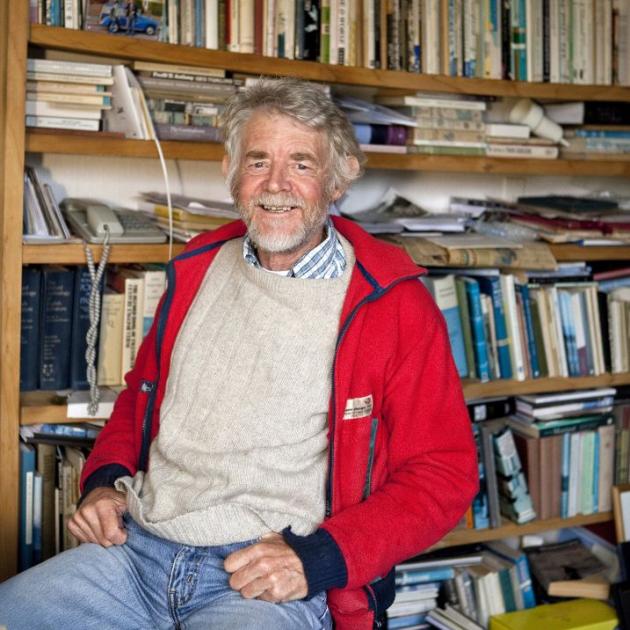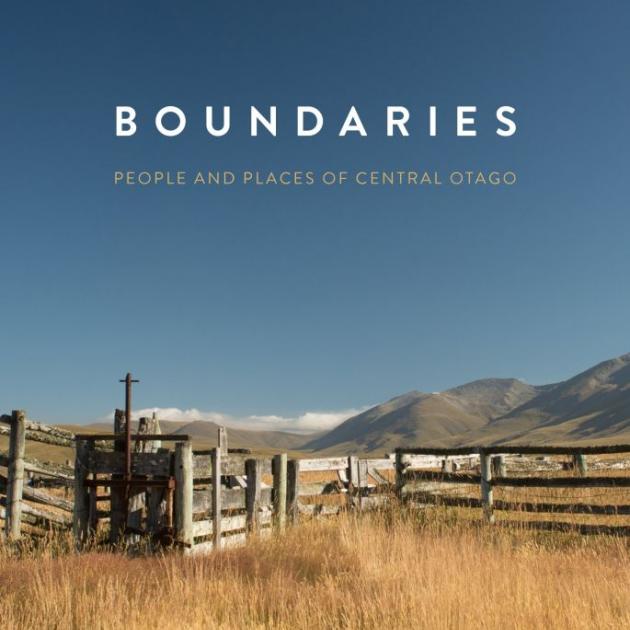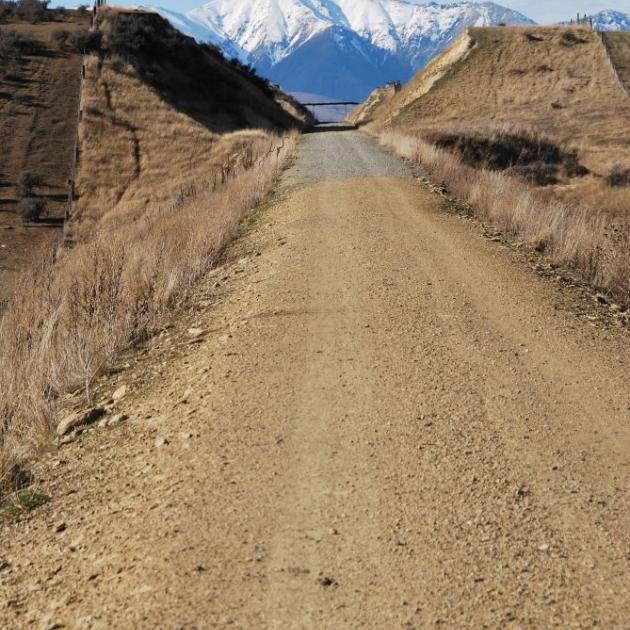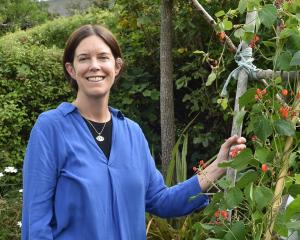Boundaries is a collection of poetry, prose and interviews by Brian Turner, his companion to Into the Wider World. This time he presents a ''more intimate'' Central Otago, through his eyes and those of long-term residents. Extracts are printed here courtesy of Penguin Random House.

THE ANNUAL BATTLE FOR THE WOODEN CUP
People who know me know that I have done many foolish things of a non-entrepreneurial nature. That may be why Rick Beattie asked me if I was available to play for St Bathans in the annual madcap Wooden Cup rugby match against Becks.
I was sitting in the Vulcan Hotel in St Bathans - resident population seven - having a beer and a yarn with a few of the local seers. St Bathans, for those who don't know, is up in the north of inland Otago near the head of the Manuherikia Valley, or thereabouts. It reeks of the bygone days, when miners and a few farmers slogged away and the roads in and out were mostly rutted tracks and corrugated metal skating rinks, and the mountains looked down on us, as they still do, and said, `You'll always take second place; we'll be here long after you've gone.'
I have digressed, but so what: digressions and country life are one and the same thing. Rick, a local farmer, and selector/coach of the St Bathans side for the annual match against the infidels from down the valley around Becks/Matakanui/Lauder and Omakau, persisted: `Are you available?'
'You must think I'm mad,' I said. `I'm sixty; not only that, Oliver [a certain former All Black captain who has a cottage nearby] reckons if I'm not careful the nor'wester will blow me over.'
Beattie grinned and scoffed, and swallowed the last of his beer. `I don't think you are mad, I know it,' he said, `but I'll take anyone. I'm having trouble getting a team together.'
The Wooden Cup was first played for in 1948. It sits on the top shelf behind the bar in the Vulcan, a wonderful old pub established back in 1882. Why the Wooden Cup? Because it's made of stained dark wood only, except for a silver band on which the names St Bathans and Becks have engraved beside them the years when they were victorious.
The match is played each year early in September on the St Bathans Domain, a kilometre down the road from the Vulcan beside the rattly Dunstan Creek that bursts out of the hills between bulky Mt St Bathans and the sprawling Dunstan Range.
This year it was one of those brisk blue spring days with, here and there, high cloud like tracery, snow on the mountains, and sparse sandy-coloured grass fluffing and bending in the keen nor'wester blowing down the ground. I drove over from Oturehua and arrived just in time to see the end of the curtain-raiser, a hockey match between the women of the district. Dozens of cars and utes and four-wheel-drives were lined up in the shelter of the pines on the western side. A few dogs, a few children, wives, girlfriends, blokes of all shapes, sizes and ages; very many cans of Speight's and the early signs of intoxication.
The Becks-Matak side were warming up behind the pines, practising line-outs and a few back moves. Some St Bathans supporters were muttering: `They're a bit serious-looking. It's a worry.'
I went and did some spying. They were much younger than the St Bathans odds and sods, and generally leaner and taller. Bugger. They all wore identical green and red jerseys. St Bathans, by contrast, were a not-quite-motley collection of young bucks and oldish codgers, and their jerseys were varied, tired and multi-coloured. I called them the Dreamcoats.
On the face of it, their chances didn't look good. But St Bathans had some distinctive ring-ins who performed with distinction: the bulky former Otago prop Steve Hotton, for instance, legs white as alabaster and hard as marble, wore his Southern club jersey from Dunedin. His legs, thick as straining posts, featured a large coloured tattoo on the left thigh.
'Oooh,' said someone or other, `I wouldn't mess with Hottie if I was playing for the Becks-Matak lot.' In his prime, Hottie was always seen as someone you didn't irritate or intimidate.
The referee, Keith Wilson, a portly, jovial joker from Omakau, summoned the teams. `Old Keith's put on the beef over the winter,' said someone who could have been Curly from Cambrian but wasn't. `Do you think he'll be able to keep up?'
'Course he will,' said magniloquent Mike Kavanagh, the publican from the Vulcan. `Just look at who's playin', will yer.'
Jim McDiarmid, a farmer at Gorge Creek, splendid and chunky and dark in the family tartan, piped the teams onto the field. `We started the Campbell clan, you know,' he says.
The ground was dry and hard and covered in coarse, straw-coloured grass liberally dotted and peppercorned with sheep droppings. On the western side, within reach of the pines' slingshots, small cones lay snagged in the grass across half the width of the ground.
'Okay boys,' said the ref, `four fifteen-minute spells.' St Bathans were to play with the wind for the first two quarters.

St Bathans got the ball from the kick-off and immediately it was obvious that they had some slick backs. Richard Harley, on the right wing, had a green plaster cast on his left wrist and hand. Mike Kavanagh said that was to protect `a bust thumb or something. Bloody good to fend them off with, don't you think?' Harley wasn't very big but he was a livewire. `Pity he wasn't bigger, or he'd have gone a long way.' Maybe Don Malcolm said that. Maybe.
A rather mature-looking Warren Stevenson from Invercargill knew what he was doing at centre. `He's a bloody handy bugger to have dragged in, Rick,' said Jim.
And Mark Pringle from Ranfurly was really smart at first- and second-five. `That Pringle, he's a good 'un, too,' said a reverent Mike.
Rick told me that `anyone who turns up with his gear gets to play, that's the rule'. I said to Stu Duncan of White Sow Valley, in his day a very fine track athlete and an excellent senior rugby player in Dunedin, `I guess that's why you are changed and waiting to go on.' Stu's thirty-seven, strong and as fit as a hare off the Hawkduns.
He looked at me and said, `I think we need to get you pissed more often, you old bastard.' Then he started cheering as Harley made a dart for the line. `Go, go! By Christ, what a lot of finely tuned athletes we've got out there.'
I heard a snort behind me. It was the runholder Dick Cavanagh, son of the late and legendary Otago rugby coach, Vic Cavanagh. I asked Dick, `Did you ever play for St Bathans?'
`No, I did not,' he shot back. `Once, thirty years ago, they deigned to ask me if I'd like to be a touch judge. I told them to get stuffed.' Actually, what he said was a bit stronger than that. Dick is nothing if not forthright, frank.
At the turn-around, after half an hour, St Bathans led 19-0. `It won't be enough,' said Frank Millar, publican at Oturehua.
`I think you could be right, Frank,' said Brian Shea, who, with Linda, owns the historic store across the road. Both kept sipping Speight's to stop their throats drying in the nor'wester.
The pessimists outnumbered the optimists at this point. Becks began to romp and press with the wind behind them. `Only a matter of time now,' said Frank. Becks nearly scored three times from pushovers, then got an overlap and scored. The conversion made it 19-7. `Fifteen minutes to go, plenty of time yet,' said Brian. Sip, slurp. By now the wind had got stronger and colder and the rickety old willow posts looked in danger of snapping - that's if the crossbar, a bent and rusty piece of angle iron, didn't come down first.
From the kick-off, St Bathans snaffled the ball and twice nearly scored. Becks came back and their winger just failed to catch the ball before the wind flung it over the deadball line. With five minutes left, St Bathans scored once more and Mike roared, `That's it, they're safe, they're safe now. The game's theirs. Here, have another beer, for God's sake.'
He wandered about as if he were delusional. `Some of those guys played really well. Dave Harbutt, Mike Watson, they'll be stiff tomorrow. And that lad Carney, he's a cracker.'
Old Col McKnight came up to me and got me to stick a fiver in the hat. `Collecting for St John's,' he said. Then he whispered in my ear: `Twenty-four-seven, that's a good effort in that wind. Those St Bathans backs, they could show the current Otago crop a thing or two. See how they ran it from a deep formation. No flat backline there.'
`You could be right, you could be right,' I said. `Maybe Rick Beattie's the man to replace Clive Woodward.'
`Rick'd like to shoot Woodward.' I can't recall who said that.
Half the St Bathans side sprawled on the grass sipping beer. Hamish Cavanagh, who played strongly, said, `First win for a while, good effort boys.'
Stu Duncan was cock-a-hoop. `What a great day, eh? This is what country rugby's all about. You wouldn't want to be dead, would you, eh?'
Mike Kavanagh came up and handed round a few more cans. `After you've finished them, I'll see you up at the pub.'
It was already crowded when I inched into the bar twenty minutes later. She was looking like being a great night in the Vulcan after St Bathans won the Wooden Cup for the first time since 2000. Amazingly, no one tore a muscle or ruptured ligaments, no one broke a leg, no one died.
In the bar Col McKnight said he wanted to add something: `About those St Bathans backs. I reckon the All Blacks are over-coached.' Nods on my right, nods on my left.
And it was rather late by the time Frank and Brian got back home to Oturehua.
• BRIAN TURNER POEMS

CYCLING IN THE MANIOTOTO
I wouldn't care to hear
why it's said we're here
in case it ruins
what it feels like now.
The meaning of life
being played out
on the undulations between
Ranfurly and Kyeburn
on a bristly summer's day
is not part of the
metaphysical agenda
as far as I know.
There's no need to worship
the God of all gracious things:
the only one worth
honouring is the will
to keep on resolutely
keeping on. I baa at sheep,
shout at magpies, moo
with cattle, marvel at
the panache of hawks
riding the air above
the Ida Range. And I ride,
my legs going round
faster than in months,
the sou'easter a helpful
lick and flutter, and
past Wedderburn,
on the gentle incline
down the straights
to Oturehua, in the distance
the skyline of the Old Man Range
is a high wire
on which the last
of the snow is caught
like strands of wool.
WHERE HEAVEN IS
When abroad in the blue and gold
glare
of summer, we say
the sky is vast and empty
without fear of refutation.
Because it is both true
and not true, a universally
acceptable pronouncement.
Like the one about things
happening of our own volition
through reason
rather than chance.
I don't believe it, and
yet, when the air is light
the sky is light, thermals
hoist the spirit
and there's no whirlwind
of pretence, just
an absence of vanity,
caring and carelessness paired.
And the sky is the one space
we cannot buy
which could be why it is said
that heaven's there.
NOR'WESTER
In the early summer mornings
when there's barely
a breath of wind
all the dry grass can do
is quiver, and then,
as the day wears on,
and the sun burns,
and a nor'wester
arrives, the grasses rock
and shake and thrash
on the dance floors of earth
and everything not tied down
is likely to take off, is said
to have been last seen
heading south and east
in a helluva hurry.











